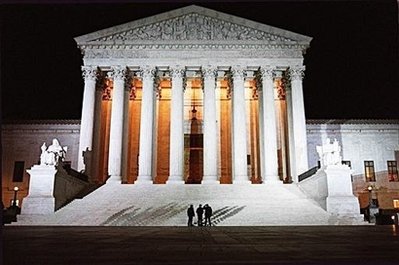January 23, 2010
Corporations are people, too (According to the US Supreme Court)
Source: Cited where applicable.

A historic moment in WTF? Depending on how you want to look at the ruling of the US Supreme Court on 21-Jan-2010, it could be either a major step twords the cyberpunk world you always wanted to (not) live in, or the beginning of the end of American democracy… maybe both. In a 5-4 split decision, the high court declared “unconstitutional” laws that kept corporations from using its own money to finance campaigns advertisements, stating that such laws were “a form of censorship.” Here are some of the details of the decision (Yahoo! News via Associated Press):
OVERTURNED
_A 63-year-old law, and two of its own decisions, that barred corporations and unions from spending money directly from their treasuries on ads that advocate electing or defeating candidates for president or Congress but are produced independently and not coordinated with the candidate’s campaign.
_The prohibition in the McCain-Feingold Act that since 2002 had barred issue-oriented ads paid for by corporations or unions 30 days before a primary and 60 days before a general election.
LEFT IN PLACE
_The century-old ban on donations by corporations from their treasuries directly to candidates.
_The ability of corporations, unions or individuals to set up political action committees that can contribute directly to candidates but can only accept voluntary contributions from employees, members and others and cannot use money directly from corporate or union treasuries.
_The McCain-Feingold provision that anyone spending money on political ads must disclose the names of contributors.
A PDF of the decision can be found here.
The gory details. The ruling came about due to a 2008 “documentary” called Hillary: The Move produced by a conservative “nonprofit” group called “Citizens United.” The group tried to use its own money, as opposed to money from its political committee, to have it distributed. But that ran against the Federal Election Commission’s rules. The group challenged the rules, and succeeded.
Fallout, and a double-edged sword? The ruling has already caused repercussions and speculations of America’s downfall. An international human rights group said that the ruling “threatens to further marginalize candidates without strong financial backing or extensive personal resources.” (Associated Press/San Francisco Chronicle SFGate). Slate calls the ruling misguided (money is speech, corporations are people), while Time Magazine’s David Von Drehle claims the ruling will give “more Americans (have) more access to more streams of political communication than ever before,” and that labor unions will be able to challenge corporate dollars with their own. USELESS FACT: Many labor unions have far less money than corporations. When money talks, whose voice do you think will be heard? Here’s a little clue from Signe Wilkinson:

As for fallout, Colorado’s Republicans are ready to file lawsuits to that state’s campaign limits removed. And in a case of that’s-gratitude-for-you, several CEOs have told Congress to stop begging for their corporate $$$.
From What is Cyberpunk?
Corporate control over society: Cyberpunk almost always has an ever powerful controlling entity that directs society. Most often this is represented as a corporation. Some times its simply an ever present singular government. A common theme for corporate control involves a futuristic dystopia, where the last traces of high civilization exist only in an enclosed and protected city, where civil liberties are removed under the guise of protecting humanity.




